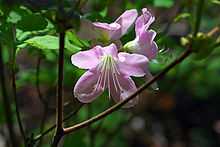Rhododendron schlippenbachii
| Rhododendron schlippenbachii | |
|---|---|
 | |
| Scientific classification | |
| Kingdom: | Plantae |
| (unranked): | Angiosperms |
| (unranked): | Eudicots |
| (unranked): | Asterids |
| Order: | Ericales |
| Family: | Ericaceae |
| Genus: | Rhododendron |
| Subgenus: | Pentanthera |
| Section: | Sciadorhodion |
| Species: | R. schlippenbachii |
| Binomial name | |
| Rhododendron schlippenbachii Maxim. | |
.jpg)
Rhododendron schlippenbachii (Royal Azalea) is a species of Rhododendron native to the Korean Peninsula and adjacent regions of Manchuria (Liaoning, Nei Mongol), Japan, and the Russian Far East. It is the dominant understory shrub in many Korean hillside forests, growing at 400-1500 m altitude.
It is a dense deciduous shrub growing to 4.5 m in height, but more commonly 1-2 m tall. The leaves are obovate, 4.5-7.5 cm long and 2.5-4.5 cm broad, with scattered glandular hairs. The flowers are white to pink, often with small red spots on the upper three petals; they are produced in late spring to early summer.
The scientific name schlippenbachii is derived from Baron von Schlippenbach, a Russian officer who collected the species in 1854.
Cultivation and symbolism
In Korea, it is called cheoljjuk (철쭉) and if the color of the petals is white, the flower is called huincheoljjuk (흰철쭉).[1][2] The Royal Azalea is commonly chosen as a local symbol in South Korea, by cities and counties such as Gapyeong and Miryang.
It is widely cultivated in other parts of the world; some cultivars bear white flowers.
References
- Flora of China: Rhododendron schlippenbachii
- Royal azalea festival of Mount Yeonin
- UConn Plant Database entry
- ↑ http://www.seongju.go.kr/english/culture/plant3_24.jsp
- ↑ 철쭉 (in Korean). Anyang Kunfo Uwang Federation for Environmental Movement Association.